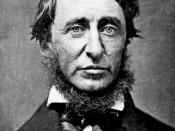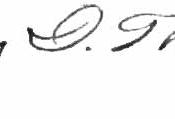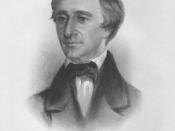Philosophers, historians, authors, and politicians have spent centuries pondering the relationship between citizens and their government. It is a question that has as many considerations as there are forms of government and it is rarely answered satisfactorily. A relatively modern theorist, author Henry
Thoreau, introduced an idea of man as an individual, rather than a subject, by thoroughly describing the way a citizen should live many of his works. He indirectly supplements the arguments he presents in his essay Civil Disobedience through a comprehensive selection of adages found in his other works. In particular, the phrases "A simple and independent mind does not toil at the bidding of any prince" and "To be awake is to be alive. I have never met a man who is quite awake" support many of the arguments in Civil
Disobedience because they help to explicate the complex ideas Thoreau presents.
The phrase "A simple and independent mind does not toil at the bidding of any prince" regards the responsibilities of a man to his own consciousness--it is a duty that can not be revoked by any form of tyrant.
Rather than hinting at a type of anarchy, this statement merely describes each man's duty to performing justice in all his actions. This does not refer to any "man's duty... to devote himself to the eradication of any, even the most enormous wrong; he may still properly have other concerns to engage him; but it is his duty, at least, to wash his hands of it, and, if he gives it no thought longer, not to give it practically his support" (681). The term "simple" does not refer to an underdeveloped sense of morality; it describes a state of mind in which the concept of justice is so defined that contradictions cannot exist. To toil,


